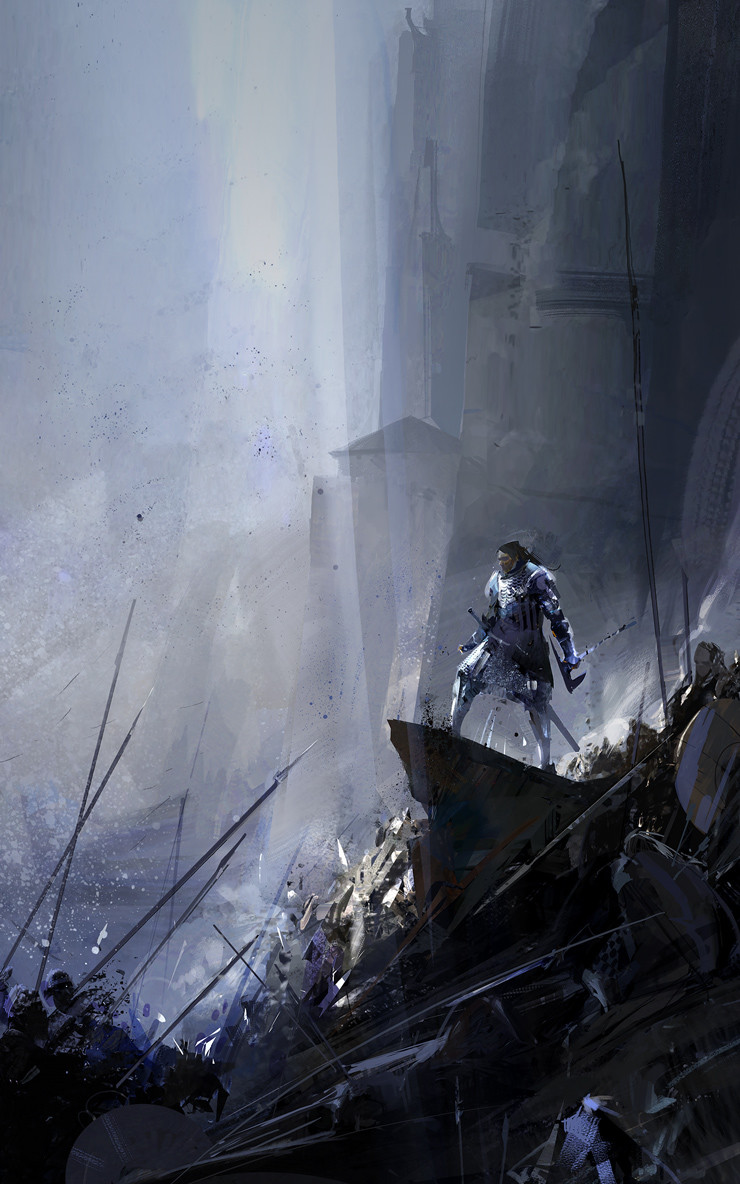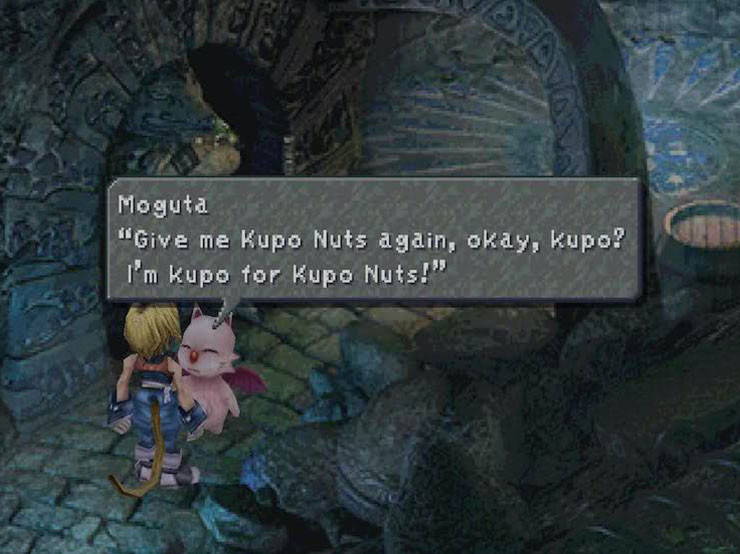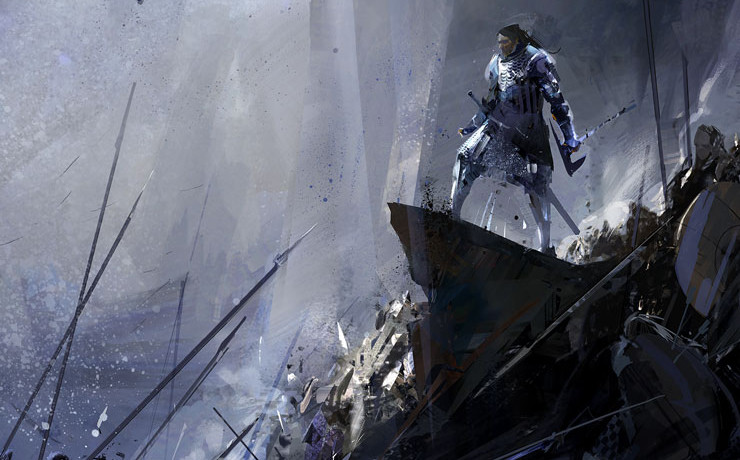It is late in the workday and I am really annoying Carl Engle-Laird, assistant editor for Tor.com Publishing and the acquiring editor for Alter S. Reiss’ novella Sunset Mantle. He explains the plot of the story to me, this congenial monolith standing before a shrieking, bone-wielding ape, but it is not enough.
“Okay, Carl…but what is the book about?”
Two days later I have read Reiss’s story—the prose is speedy, engaging, and ideal for 45-minute commutes on the subway—but I still don’t have an answer to my own question. Sunset Mantle, as far as I can tell, is about a man who thinks he is done fighting but who ends up becoming the figurative rock that allows an enormous independent community to withstand the tide of culturalization. Richard Anderson’s cover is very apt in this regard, a scene from the book exaggerated in scale so that the essence of that scene is given the emotional weight it deserves. So really I do have an answer to the question of just what Mantle is about. I’m just not satisfied with that answer.
(P.S.—Here’s the full Richard Anderson cover because it’s just TOO. PRETTY. to be contained within a mere crop.)

A man who finds himself holding the line against impossible odds, even begrudgingly, is a very common dramatic framework. Conveying that kind of drama in the setting of an epic fantasy can be a lot of fun, as it allows a writer to enlarge the drama to an extent that we rarely get to experience in the real world. In Tolkien’s Lord of the Rings saga, all Frodo has to do is drop a ring in a hole, but that hole is actually a VOLCANO and that volcano is secreted deep within THE DARKEST KINGDOM ON EARTH and SAM CAN BE REALLY ANNOYING SOMETIMES. We know that Frodo is the least physically powerful combatant in the saga, but that he carries the same desire for resistance that we as readers see in ourselves. So it’s thrilling to see Frodo’s struggle inspire others to help him continue his efforts. This is an inspiring genre of fiction to read; and popular, as evidenced by the fact that there’s so very much of it available.
Sunset Mantle shares this progression, but despite it carrying the trappings of a medieval-esque epic fantasy, its story about resistance is a small one. The main character, Cete, finds himself central to the story simply because he’s the most experienced and competent warrior in the Reach Antach, the distant city into which he has wandered. To be sure, Sunset Mantle chronicles an event that is important to establishing the future of this city, but the outcome of this event surely isn’t the end of the story. The gears continue to turn in the world at large and although the events of Mantle may start a ripple in the pond of this fantasy world, it is left to the reader to imagine what those ripples may be. To continue the Lord of the Rings comparison, it’s like starting Tolkien’s saga with the story of the pragmatic general who trained the soldiers of Helm’s Deep just before it was swarmed with orcs.
Those familiar with video game RPGs like Final Fantasy or Dragon Quest would call this kind of small story a “sidequest.” In these epic fantasy video games, these are optional quests that have implications towards your main quest, but aren’t large enough to justify occupying your entire gaming experience. These games communicate repeatedly that the focus of you the player will be the problems menacing the entire world, not just one person, or one town.

Readers of epic fantasy demand a scope of a similar world-shattering size, if only to justify the time they will invest in poring through several 900+ page novels. Grand adventures are emotionally satisfying, as well, and the deeper a reader can get pulled into them, the more the reader will feel as if they are the one undertaking the quest. The length of epic fantasy novels is a factor in achieving this depth, as a longer story allows for greater detail and variation to be depicted.
My head has been filling up with works of fantasy this year. I finally checked out Max Gladstone’s Craft Sequence series, which is epic, and fantasy, but somehow neither. I’ve read Jason Denzel’s forthcoming debut novel Mystic, and skimmed the two new Mistborn novels, but mostly I’ve been entirely submerged within The Wheel of Time Companion. The companion volume to Robert Jordan’s epic is dense with information, so much so that it’s been difficult for me to find things that are truly unknown. But they’re definitely in there. And it’s a rewarding experience to stumble across them. As if Robert Jordan is answering a question that only he and I ever thought to ask.
To me, the most rewarding bits within Jordan’s Companion are the “small stories.” The Sunset Mantles that he never managed to fit within the worldwide scope of The Wheel of Time, like Mazrim Taim’s harassment of The Two Rivers, the tragedy behind Serafelle Sedai’s decision to become an Aes Sedai, or the “training” that Cadsuane foisted upon an Amyrlin. These have little, if any, real effects on the main storyline of The Wheel of Time but they give a surprising amount of momentum to the series as a whole. These are stories, small stories, that play out quietly in their entirety while I’m off paying attention to other characters. Missing these small stories in an epic makes that fantasy world feel more like our own. After all, how many stories do we miss in our own lives?
There is plenty of room in epic fantasy for the small stories, it seems. Not only that, but I’d go so far as to say that the “small stories” are what define the epic scope of fantasy. These are the “bricks” in the firmament of these worlds, the guarantee that there is something the reader can explore just over the horizon, the promise that there are real people affected by their world’s perch on the edge of doom.
So maybe, when I asked Carl what Sunset Mantle was about, he was stymied as to why someone who’s head has been bubbling under the surface of epic fantasy all this year would be unaware of the obvious truth of “small stories.” This truth was obvious to editor Robert Silverberg when he assembled Legends. And to John Joseph Adams when he assembled Epic. And Shawn Speakman when he crafted Unfettered. The impact of small stories in epic fantasy certainly doesn’t escape George R. R. Martin, who has fashioned several epics, several anthologies, and ascended to the status of cultural icon on the strength of his “small stories.”
See, now I just feel foolish. Better informed, and foolish. Thanks, Carl and accompanying horse calendar.

Chris Lough is the production manager of Tor.com and was actually thrilled to discover the major exports of all the countries in Randland. What? Economies are interesting.











Not pictured on the cover: optional severed head soaring through the air.
I miss you, severed head.
Great job Tor, great job Chris. A solid reply to all the salty naysayers bashing other WoT Companion articles.
As you aptly pointed out, there are gems in each of the Spin the Wheel entries we’ve gotten so far, “like Mazrim Taim’s harassment of The Two Rivers, the tragedy behind Serafelle Sedai’s decision to become an Aes Sedai, or the “training” that Cadsuane foisted upon an Amyrlin.”
Wow, that Reiss cover. Wow.
Oh and the short fiction of Kate Elliott also fits the “Small stories in Epic fantasy box”
Small stories are great when integrated well, and have purpose from the beginning of the book or series.
But I hate when authors get bored with the main story and have to start each subsequent book with some character or small story we care nothing about, just because they have no idea how else to start things, or are avoiding the pressure of jumping into the main arcs, or because they think it’s clever to postpone the parts the reader really wants to know about. Or the ones who are obviously stuck in the book so they start up some other story within it, and it just results in a plot thread I don’t care about and which makes no difference in the long run. I’m looking at you GRRM. Well, him and every other author of multi-series books who has done this. I never end up caring about these sections or stories and wish that the author had discipline and focus.
Then there are authors like LeGuin or Vance, who can build worlds out of small stories to the point where they become the big story. Those are amazing. Sadly, they’re also in the minority.
The Goblin Emperor is also a small kind of story. It’s just that it took place at the center of something very large.
I’m not sure if it’s a small story or just a very tight focus on a very small part of a large story, but Jeff Salyards’ Bloodsounders’ Arc books (Scourge of the Betrayer, etc.) spring to mind.
I just got this Sunset Mantle uploaded to my Kindle last night. I had pre-ordered it -couldn’t resist with the low price.
Now I’m really jazzed to start it.
A scene that immediately popped into my head is a small aside in David Gemmell’s Legend. I honestly don’t remember much about the book, but there was one small scene where the point of view switched from the defenders (i.e. the good guys) to the ones fruitlessly attacking the wall of the city. It was probably only 3 pages, gave them a quick back story, a jaunty comment, and you just KNOW those two people are going to die in the next attack. It made it really awesome and sad.
Give me small stories any day of the week. I am sick to death of reading stories where THE FATE OF THE WORLD HANGS IN THE BALANCE.
And of course the major source of epic fantasy is the stories of Conan by Robert E. Howard (not novels). And not Tolkien.
On topic: There is definitely room for short stories in fantasy. I love my 1000-page epics, but shorter works that still manage to evoke a sense of wonder, introducing a world, characters and conflict in a short space can be just as brilliant. Case in point: the sequence of short stories posted here from the Vault of Heaven series by Peter Orullian – after reading those, I had to go out and buy the full novel set in the same world.
Off topic: I’m sitting here twitching at the fact that there is someone who has advanced access to the new Mistborn novels and has just “skimmed” them… P.S. I’ll take your copies if you’re done with them ;)
I’m a big fan of Patricia McKillip, and many of her novels are not especially big or epic in scope. They tend to be small-scale and very intimate in nature. One example: The wonderful ‘Forgotten Beasts of Eld.’